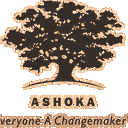From illegal loggers to sustainable forestry champions
Turning dreams into collective power in Indonesia
Indonesia is host to some of the largest rainforests in the world, and also tops the list for rapid deforestation, with dire repercussions on economic, human, and planetary health. Yet, the country is also emerging as a bright spot in the fight against illegal logging. According to the World Resource Institute, the rate of primary forest loss decreased for the fourth year in a row in 2020.
To understand what is behind this transformation, we spoke with Ashoka & Skoll Fellow Onte (Silverius) Unggul, co-founder of Telapak. The community-based, data-driven logging cooperatives he helped found are literally transforming Indonesia’s landscape and making sustainable forestry a viable alternative for (formerly) illegal loggers across 27 Indonesian provinces. You can hear the full conversation here.
Here are the highlights:
Voice of Nature
Onte spent a lot of time in his childhood visiting the forests of Kendari, South Selawasi, his hometown. As an agriculture student in university, he started noticing that Indonesia’s lush rainforests were disappearing due to rapid deforestation, dramatically changing not just the landscape but people’s ability to put food on the table. This led him to launch “Voice of Nature”, his first entrepreneurial venture, to bring visibility to the problem.
From raising awareness to building solutions
Though advocacy and awareness campaigns brought much needed attention to the issue of deforestation, change was slow in coming because rural illegal loggers simply didn’t have an alternative to make a living. Onte and his co-founder realized that they would only succeed if they truly understood their needs, and helped them realize their dreams.
The power of collectives
This is when Telapak was born. They set out to demonstrate that it was possible to make a living and protect nature. Leveraging Forest Stewardship Council’s sustainable forestry certification, Onte and his team created the first building blocks of Indonesia’s sustainable forestry industry. They got illegal loggers to pool their small plots of land together, and built sustainable forestry cooperatives in a few regions of Indonesia. Along the way, they realized that these individual cooperatives would have much more power if they banded together. Onte calls this “social conglomeration,” a practice also known as mutualism, which could usher in a radically new era for socially driven businesses.
Social forestry as a national policy
Up until now, the farmer cooperatives brought together small plots of privately-owned lands. A big new opportunity is opening up to further scale this social forestry model, as Indonesia’s government recently announced it would be giving out permits to manage public, state-owned lands.
The era of socially-driven businesses is here
The business world is taking note of the promise of social conglomeration to solve pressing social problems, while enabling people to build sustainable livelihoods. One indicator that Onte’s approach is gaining speed is that he was recently appointed to Indonesia’s Chamber of Commerce, as its Chair for Environment and Forestry. This is the first time in the history of the Chamber that a social entrepreneur occupies this post.

